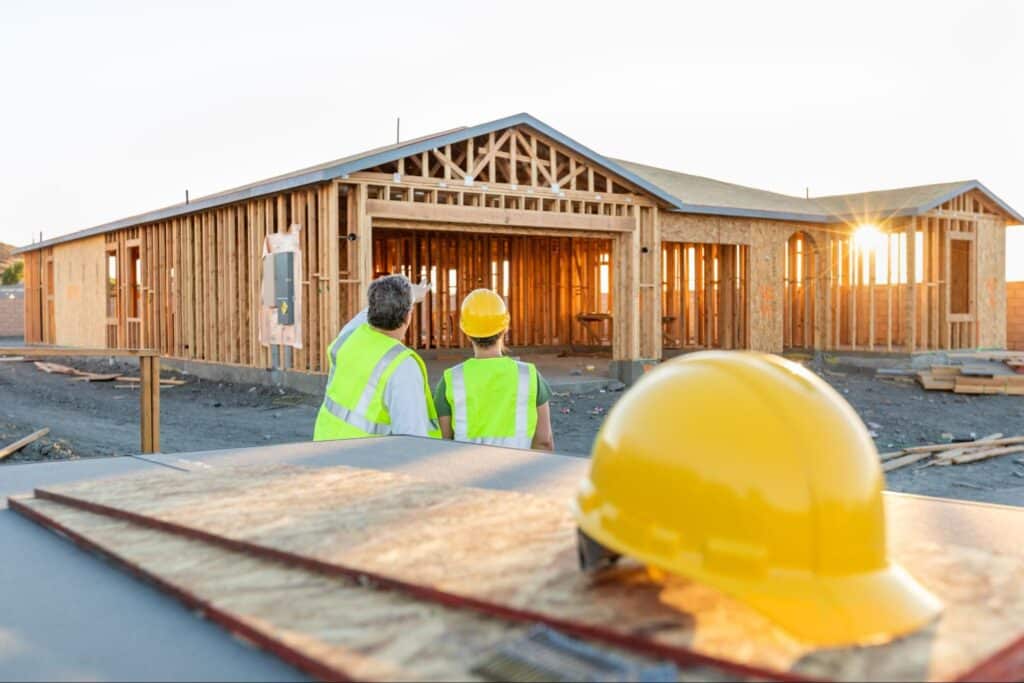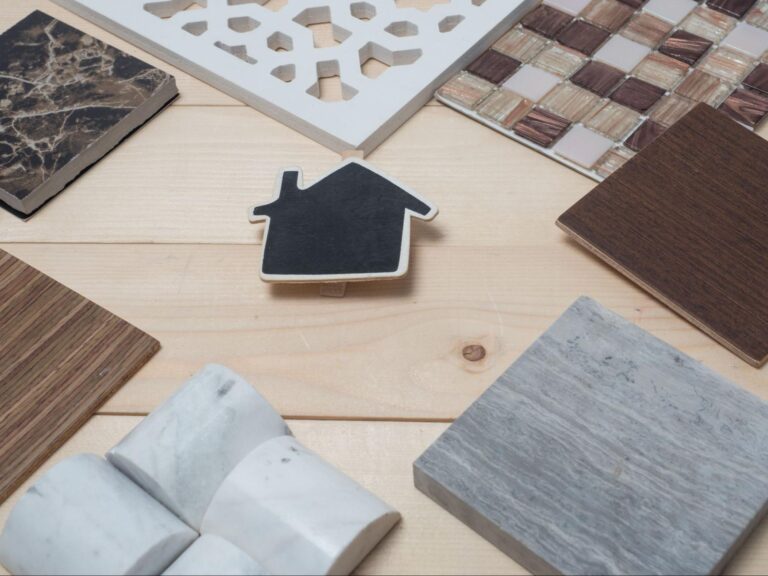Building your dream home is an exciting milestone, but it can also feel overwhelming. It represents one of the biggest financial and emotional investments you’ll likely ever make. Choosing the right home builder for your project can be a daunting task, and it is the most critical decision in the process. Whether you’re looking to build a custom or semi-custom home, it’s important to have the right team of professionals in place to ensure that the job is done right.
This guide will walk you through the entire process, from understanding your needs to making a confident final decision. We’ll cover how to find and vet potential builders, the essential questions to ask, and how to ensure you’re choosing a partner you can rely on for this deeply personal project.
Step 1: Laying the Groundwork – What to Do Before You Search
Before you start visiting model homes and interviewing builders, taking the time to prepare is the most important first step. Laying this groundwork ensures you begin your search with clarity and confidence, making the entire process smoother and more successful. This initial phase involves two key components: understanding your financial picture and defining your project needs.
Define Your Financial Picture
Before you even begin looking for a builder, it’s crucial to have a clear understanding of your financial situation. Building a home is a significant investment, and setting a realistic budget from the outset will guide your decisions and prevent financial strain down the road. Start by determining what you can comfortably afford, and then take the vital step of getting pre-approved for a construction loan. Pre-approval not only gives you a clear budget to work with but also shows builders that you are a serious and qualified buyer.
Define Your Project Needs
Once you have your budget, it’s time to define the specifics of your project. Knowing exactly what you need will help you narrow down your list of potential builders and find the right one for the job.
What is your desired timeline?
Consider when you’d like to start construction and when you need the home to be move-in ready. A clear timeline will help you and your builder set realistic expectations from the beginning.
How much customization do you want?
Be clear about the level of personalization you desire. Are you looking for a builder who offers standardized plans with limited changes, or do you want a semi-custom or fully custom home? Understanding the difference between production, semi-custom, and custom builders will help you find a partner who can meet your design expectations.
Where do you want to build?
If you already own land, you’ll need a builder with experience in site evaluation and preparation, including checking zoning, soil conditions, and utility access. If you don’t have land, you’ll want to find a builder who offers lots or builds in specific communities that you’re interested in.
Step 2: Understanding the Different Types of Home Builders
Now that you have a clear vision for your project, the next step is to understand the different types of builders and identify which one best aligns with your needs. The terms “production,” “semi-custom,” and “custom” refer to the level of flexibility and personalization a builder offers. Choosing the right type of builder is crucial for ensuring the process matches your expectations for design, budget, and involvement.
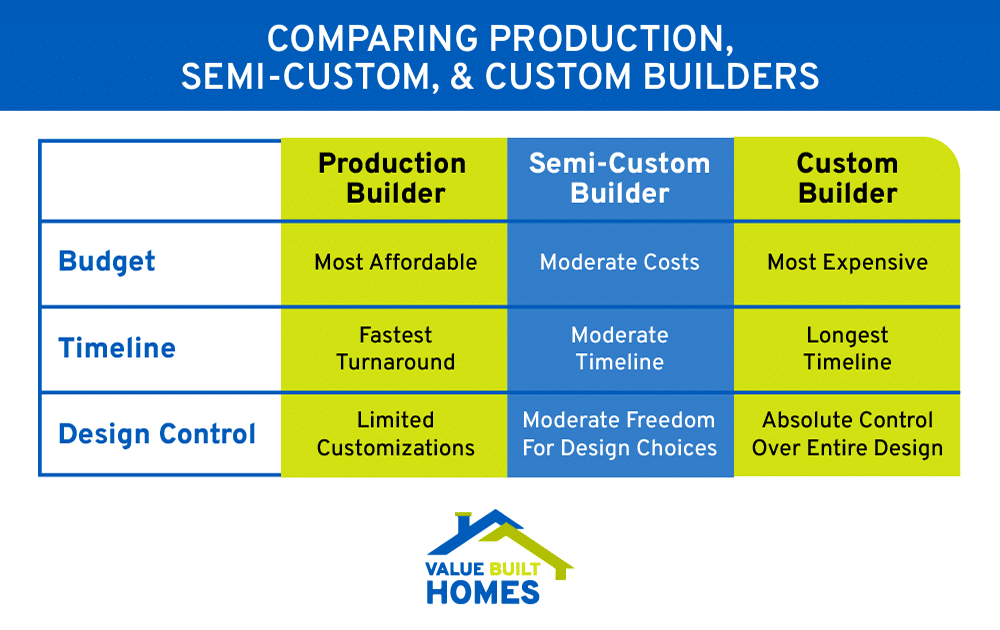
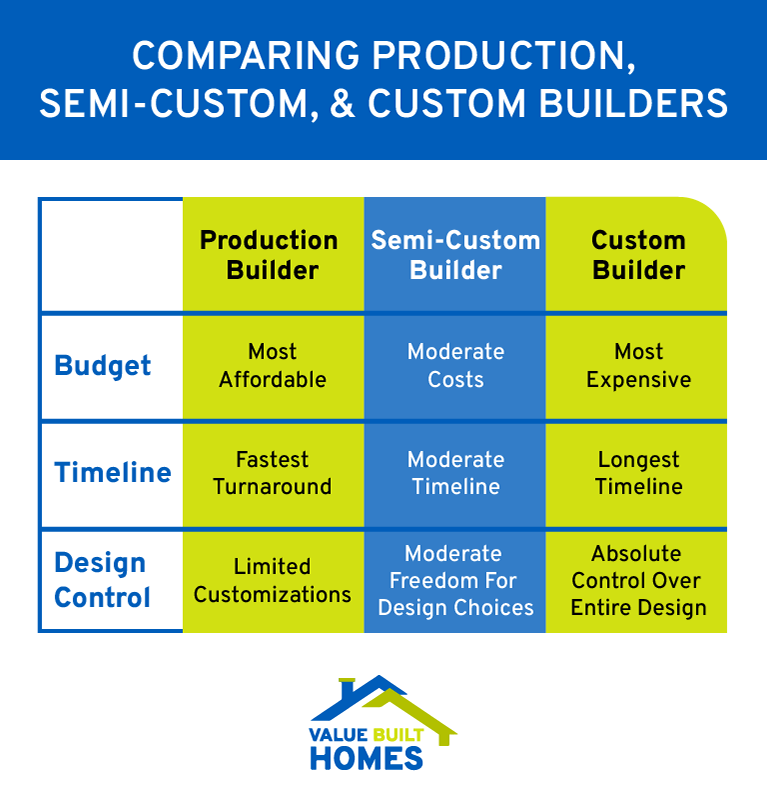
Production Home Builders
A production home builder constructs multiple homes based on well-established layouts, ordering materials in bulk to keep costs predictable and timelines efficient. By standardizing many aspects of the construction process, they create a smooth and straightforward experience for homeowners.
- What they are: These builders specialize in creating homes from a portfolio of pre-designed plans, often within a specific community. They offer set packages for finishes and fixtures, which streamlines the building process.
- Pros: This approach leads to more predictable costs, faster and more reliable timelines, and a simpler, less overwhelming decision-making process for the homebuyer.
Semi-Custom Home Builders
A semi-custom home builder bridges the gap between the efficiency of production homes and the flexibility of custom builds. They are an excellent choice for buyers who want to personalize their home without starting the design process completely from scratch.
- The middle ground: You will typically start by choosing from one of the builder’s existing floor plans and then make modifications to suit your specific needs. This could involve minor layout changes, reconfiguring rooms, or selecting from a much wider range of finishes and materials than a production builder offers.
Custom Home Builders
A custom home builder is for those who want to create a one-of-a-kind home designed from the ground up. This path offers the highest degree of personalization but also requires the most significant investment of time and money from the homebuyer.
- Building a unique home from scratch: You will work closely with an architect and the builder to design a floor plan that is tailored to your exact lifestyle and preferences. Every detail, from the foundation to the rooflines and interior finishes, is your decision.
- Pros and Cons: The primary advantage is complete creative control and a home that is uniquely yours. However, this process generally comes with a higher price tag, a longer and more complex construction timeline, and can involve more unforeseen surprises and complications.
Step 3: How to Find and Research Potential Home Builders
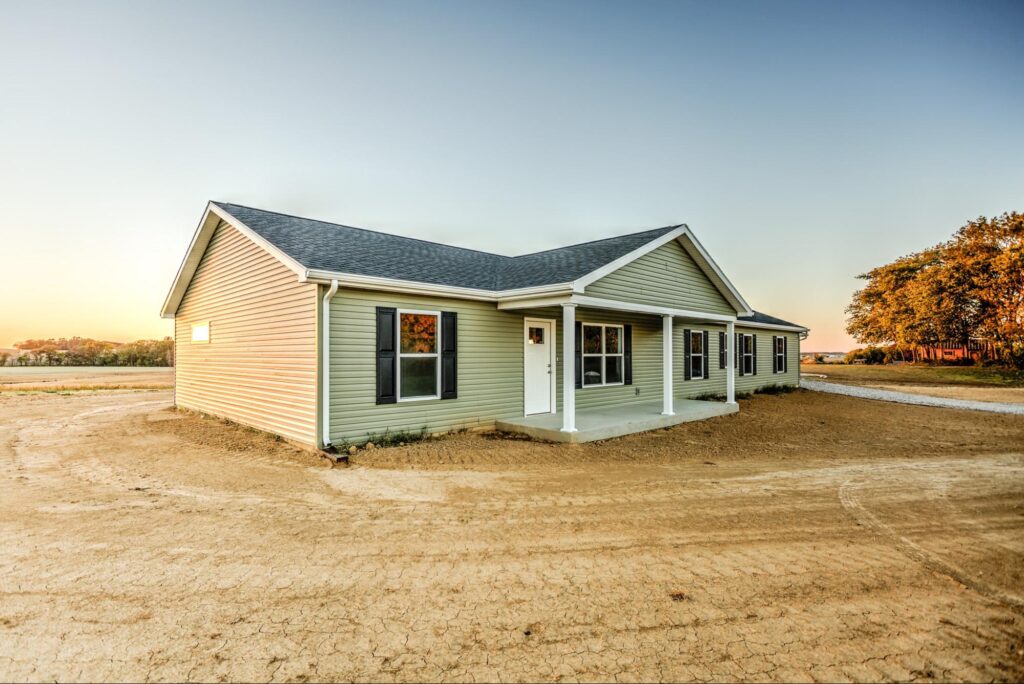
With a clear understanding of your needs and the type of builder you’re looking for, it’s time to start compiling a list of potential candidates. This research phase is critical for finding reputable builders in your area and weeding out any that don’t meet your standards.
Where to Start Your Search
Finding the right builder begins with knowing where to look. A combination of in-person research and online resources will give you the most comprehensive list of options.
- Look at new construction: Start by driving through communities where you might want to live and take note of the builders who are actively constructing homes. This gives you a firsthand look at their work and the types of projects they handle.
- Ask for recommendations: Reach out to friends, family members, and local real estate agents. Personal referrals are one of the most reliable ways to find a trustworthy builder, as you can get an honest account of their experience.
- Use online resources: Professional organizations are an excellent resource for finding credible builders. Search the online directories of the National Association of Home Builders (NAHB) and its local chapters in your area to find a list of registered and reputable members.
Initial Warning Signs to Watch For
As you begin your research, you may encounter some builders who raise immediate red flags. Trust your instincts and be on the lookout for these initial warning signs:
- Lack of an online presence or professional website: In today’s market, a reputable builder should have a professional website that showcases their portfolio, services, and contact information. A weak or nonexistent online presence can be a sign of an unstable or less-than-professional operation.
- High-pressure sales tactics: Be cautious of any builder who tries to rush you into a decision or offers a “special price” that is only good for a very limited time. A quality builder will understand that this is a major decision and will give you the time and space you need to feel comfortable.
- Vague answers to initial questions: When you ask about their process, timeline, or experience, you should receive clear and confident answers. If a builder is evasive or can’t provide specifics, it may indicate a lack of experience or a lack of transparency.
- Unwillingness to provide references: A builder who is proud of their work should be eager to provide you with a list of past clients. If they hesitate or refuse to provide references, consider it a major red flag and move on.
Step 4: The Vetting Process – 14 Essential Questions to Ask Every Builder
Once you have a shortlist of potential builders, it’s time to move into the interview phase. This is your opportunity to dig deeper than what you can find online and truly understand each builder’s process, values, and professionalism. Asking the right questions is the most effective way to ensure you are making an informed decision and choosing a partner you can trust.
Background and Reputation
- What is your experience, are you licensed & insured, and can you provide recent references? A reputable builder should be able to provide proof of current licensing and insurance, including general liability and workers’ compensation. Ask for references from clients who have completed homes in the last 1-2 years, and don’t hesitate to call them to ask about their experience.
- Do you use consistent subcontractors, and how do you ensure their quality? The quality of the plumbers, electricians, and other tradespeople will directly impact the quality of your home. Ask if the builder has long-standing relationships with their subcontractors, as this often leads to better coordination and higher-quality work.
- Why should I choose your company over others? What makes you different? This question gives the builder a chance to articulate their unique value proposition. Listen for specifics about their design process, commitment to quality, or customer service that set them apart from the competition.
Budget and Pricing
- How does my budget align with your offerings, and can you provide a detailed, transparent price breakdown? A good builder will be upfront about whether your budget is realistic for what they offer. Ask for a detailed price breakdown that clearly outlines all standard features and, just as importantly, specifies what is not included. Pay close attention to allowances to ensure they are realistic for the quality you expect.
- What is the required deposit and the detailed payment schedule? Understand the financial commitments from the start. Payments should be tied to the completion of specific construction milestones (e.g., foundation poured, framing complete), rather than arbitrary dates. Be wary of any builder who requests large sums of money upfront.
The Building Process & Timeline
- Can you outline your building process and estimated timeline? The builder should be able to clearly articulate the major phases of construction and provide a realistic timeline. Ask who your primary point of contact will be and who will be supervising the construction site daily.
- What is your communication plan throughout the build? Clear and consistent communication is key to a smooth process. Ask how often you can expect updates, what method will be used (email, phone calls, meetings), and what their typical response time is.
- How do you handle unexpected issues or delays during construction? Problems can arise even with the best planning. You want a builder who takes a proactive, problem-solving approach. Ask for examples of how they have handled unexpected issues in the past to gauge their accountability.
Design, Quality, and Features
- How much flexibility is there for customization, and what’s the process? Be clear about the level of personalization you desire. Understand the builder’s process for making design selections and how changes to standard plans are priced and managed.
- How do you ensure construction quality, and what specific materials do you typically use? Don’t settle for vague answers. Ask about their quality control procedures and for specifics on the materials they use for critical components like insulation, windows, and roofing.
- What energy-efficient features and building practices do you incorporate? Ask for details on their energy-efficient features, such as the R-value of the insulation, the efficiency ratings of the HVAC systems, and whether they build to standards like ENERGY STAR.
Contracts, Changes, and Warranties
- What is your formal process for handling change orders initiated by me? Changes during construction are a common source of budget overruns. Ensure the builder has a formal, written process for handling change orders that details how the cost and impact on the schedule will be handled.
- What type of home warranty do you offer, and what does it cover? A builder’s warranty is a reflection of their confidence in their work. Ask for a sample copy of the warranty document so you can understand what is covered and for how long.
- Can I review your standard contract before committing? A reputable builder should willingly provide a copy of their standard contract for you to review. It should clearly detail the scope of work, final price, timeline, and all other critical aspects of the project. It is always recommended to have your own real estate attorney review the contract before you sign.
Step 5: Making Your Final Decision
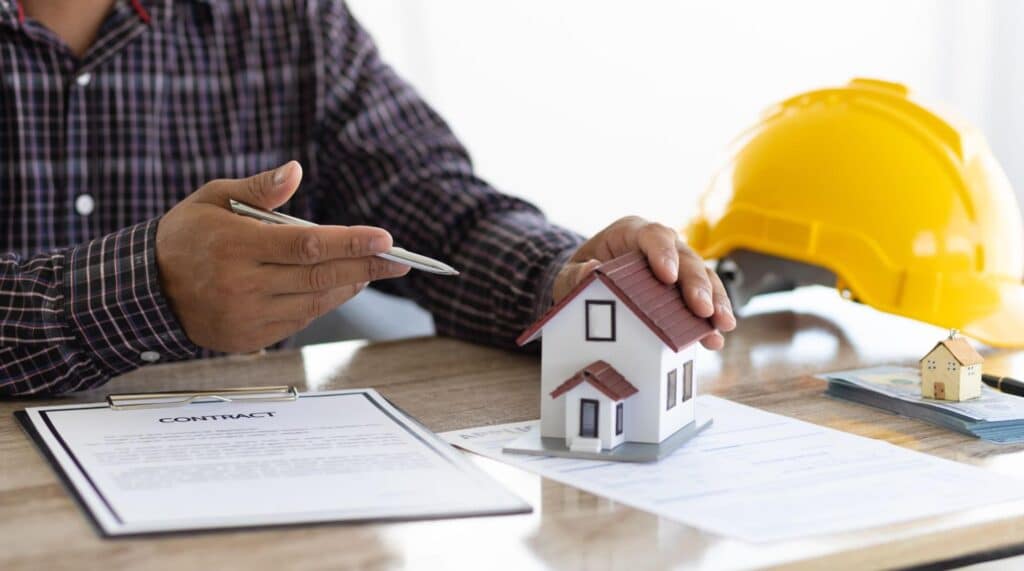
After thoroughly researching and interviewing your top candidates, you should have all the information you need to make a confident final choice. This decision is about more than just numbers on a page; it’s about choosing a long-term partner for one of the most significant projects of your life.
Start by comparing the proposals and detailed answers you received from each builder. Look beyond the bottom-line price and evaluate the specifics of what each builder is offering in terms of materials, features, and allowances. A lower price may not be the best value if it comes with lower-quality materials or unrealistic allowances that will lead to costly upgrades later.
Finally, trust your gut. Who did you have the best rapport with? Who was the most transparent and straightforward in their communication? You will be working closely with this builder for many months, so it’s essential to choose someone whose communication style you respect and who you feel is genuinely invested in bringing your vision to life.
Before You Sign: Key Items Your Contract Must Include
The contract is the most important document in the home-building process, as it protects both you and the builder. Before you sign, ensure it is comprehensive and clear. Your contract must include these key items:
- Detailed Scope of Work: This should include the final blueprints and a comprehensive list of specifications (a “spec sheet”) that details everything from appliance models to paint colors.
- Final Price and Allowance Details: The contract should state the total price and provide a detailed breakdown of all allowances. Ensure you understand what happens if you go over or under on these budgeted items.
- Payment Schedule: This should clearly outline the payment amounts and tie them to the completion of specific construction milestones (e.g., foundation, framing, drywall), not arbitrary dates.
- Estimated Start and Completion Dates: The contract should specify a target start date and a projected completion date for your home.
- Change Order Procedures: There must be a formal, written process for how changes are requested, approved, and priced.
- Warranty Information: The contract should include a copy of the builder’s home warranty, detailing what is covered and for how long.
- Dispute Resolution Clause: This section outlines the process for resolving any disagreements that may arise during the project.
Most importantly, always have a qualified real estate attorney review the contract on your behalf before you sign. This small investment provides crucial peace of mind and ensures your interests are fully protected.
Your Journey to a New Home Starts Here
Choosing the right home builder is a deliberate process that requires careful research, thorough vetting, and asking detailed questions. It is one of the most important decisions you will make in your home-building journey. By following the steps outlined in this guide you can move forward with confidence and select a partner who will bring your dream home to life.
If you’re looking for a builder dedicated to quality, affordability, and a smooth, stress-free experience, Value Built Homes is here to help. We are a team of experienced professionals committed to building new, quality homes where costs are minimized and complex decisions are eliminated. Ready to explore your options? Contact Value Built Homes and take the next step toward building a home that suits your lifestyle.

